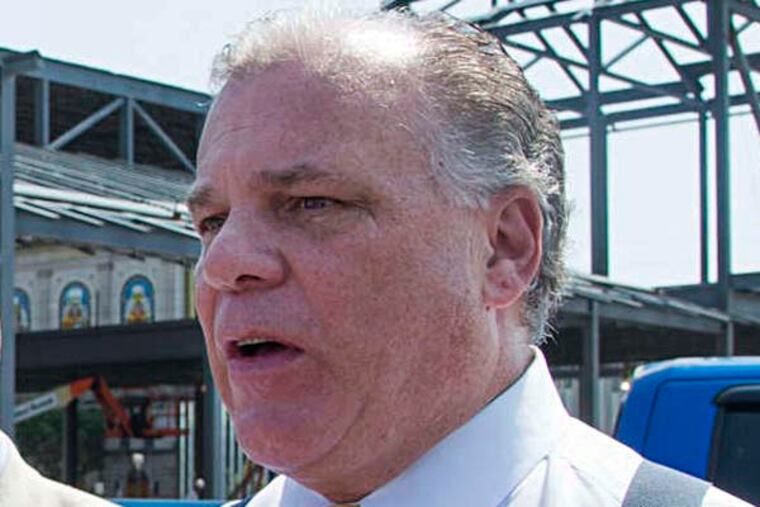Sweeney proposes tax increase on income over $1M
TRENTON - New Jersey Senate President Stephen Sweeney introduced legislation Thursday that would raise the marginal tax rate on income above $1 million, a measure he said would help fund the pension system, but one that almost certainly will be vetoed by Gov. Christie.

TRENTON - New Jersey Senate President Stephen Sweeney introduced legislation Thursday that would raise the marginal tax rate on income above $1 million, a measure he said would help fund the pension system, but one that almost certainly will be vetoed by Gov. Christie.
Sweeney (D., Gloucester) also proposed increasing a tax credit for the poor. Christie, a Republican, cut that credit in 2010 amid a budget shortfall.
"No one likes to increase any tax," Sweeney said in a statement, "and it would not be necessary to do so if New Jersey did not rank near the bottom in economic, revenue, and job growth under the Christie administration."
Christie's proposed $33.8 billion budget for the fiscal year that begins July 1 includes a $1.3 billion contribution to the pension system for public employees, about $1.8 billion short of what is required by a 2011 law. The law mandates that the state and public workers increase pension contributions.
The Democratic-controlled Legislature has passed several budgets during Christie's tenure that included tax hikes on New Jersey's highest earners. The governor, who is traveling in New Hampshire as he considers running for president, has nixed those taxes each time, using his line-item veto.
At a news conference last week in New Brunswick, Christie said Democrats had blocked his economic policies. Raising taxes is "the only prescription that Democrats ever have for any problem in the state," he said.
If Sweeney thinks increasing taxes "is going to lead to economic growth, then, you know, he hasn't been watching what's happened in New Jersey over the course of the last number of years," Christie said.
Sweeney's announcement came a day after the state Supreme Court heard oral arguments in a lawsuit in which public-sector unions allege Christie violated the 2011 law by failing this fiscal year to make the full contribution to the pension system.
"The new revenue will help the state meet its financial obligations," Sweeney said Thursday, "and restore the fiscal stability that is needed to get the economy moving."
His bill would raise the tax rate on income above $1 million from 8.97 percent to 10.75 percent for four years.
This would generate about $675 million for fiscal 2016, according to Sweeney's office. To make the state's full annually required contribution to the pension system in accordance with the 2011 law, Democrats would still need to find more than $1 billion in additional revenue or cuts elsewhere in the budget.
Christie has said Democrats have overestimated how much revenue the "millionaire's tax" would bring in.
The 8.97 percent tax bracket currently covers income greater than $500,000. That rate was established in 2004 under Democratic Gov. Jim McGreevey.
Gov. Jon S. Corzine, also a Democrat, raised the top rate in 2009 to 10.75 percent on income above $1 million. Christie vetoed an extension of the rate in 2010.
The pension system's unfunded liability is about $40 billion under state accounting methods and $83 billion using a national standard.
Sweeney's bill would increase the Earned Income Tax Credit for the working poor from 20 percent of the federal credit to 25 percent, reversing Christie's cut in 2010.
Credit amounts vary; the maximum federal credit for a tax filer with two children is $5,548. Currently, eligible residents can also receive 20 percent of that on their state income tax forms.
Sweeney said increasing the credit would cost about $60 million.